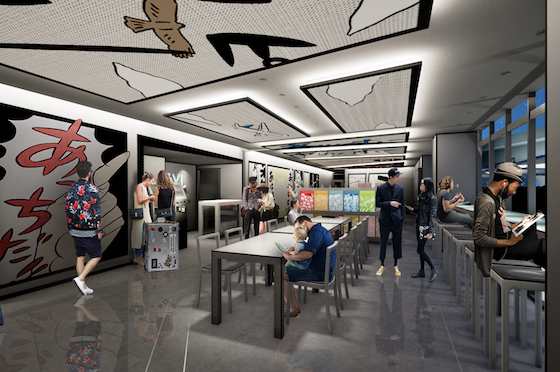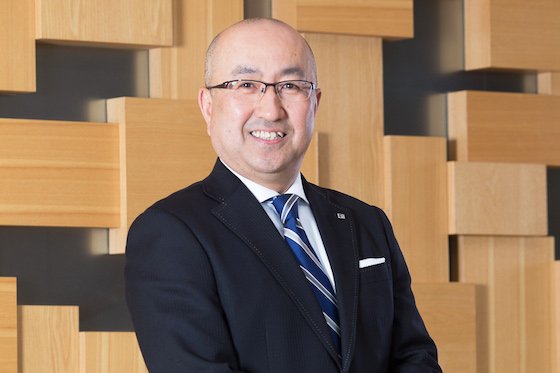Responding to a vibrant tourism economy and shifting consumer demand, Fujita Kanko Inc. is reaching beyond its traditional niche into new markets. Among the Tokyo-based operator’s initiatives are a new flag targeted to millennials, a glamping product and its first property located beyond Japan’s borders.
Fujita Kanko, established in 1955, runs luxury resorts, wedding and banquet facilities, leisure properties and 35 mid-priced hotels. Its flagship is the 5-star Hotel Chinzanso Tokyo.

Its new brand, Tavinos, is aimed at “adventure-seeking millennials” and international, budget-conscious visitors. The product keeps a lid on costs through labor-saving technology and minimal staffing. A striking Manga (Japanese comics) theme will dominate the décor, created to provide a uniquely Japanese experience. The 129-square-foot rooms will be sparsely furnished, check-in and -out will be automated, and each hotel will come equipped with an AI concierge that can both help with activities and connect like-minded guests.
The first Tavinos hotel is scheduled open in August 2019 with 188 rooms, followed by a second property in May 2020 with 278 rooms, both in Tokyo. Five more are planned for 2021 in key urban destinations that attract foreign guests. Nightly rates are pegged around US$92.
Tavinos comes at an auspicious time. Tourism to Japan has been on a steady growth trajectory for seven straight years, reaching an estimated 30 million inbound travelers last year. The Japanese government wants to see that figure grow to 40 million annually by 2020, when Tokyo will host the summer Olympic Games. That push by the government and demand for rooms during the event have spurred a rash of development across the board. It remains to be seen whether stumbles in the world economy, particularly the China-U.S. trade war, will impact tourism to Japan.
While Fujita Kanko has seen the share of foreign guests climb at its hotels, especially the midmarket Hotel Gracery and Washington Hotel brands, Tavinos is designed with a younger demographic in mind. “Millennials are about 35% of overall foreign guests at our properties, and we definitely see room for growth,” says Yoshihiro Ise, senior managing executive officer.
“Our strategy behind the new brand is to plant seeds with millennials and grow them into lifelong customers,” Ise adds. “As they move into different stages of their lives, we intend to introduce them to our other properties, such as our resort and luxury properties.”
Ise sees Tavinos as a third core brand. The company is considering expansion through franchising and management contracts for other developers. The initial Tavinos will be new-builds, but conversions are a possibility down the road, he adds.
Meanwhile, Fujita Kanko planted its first flag beyond the Japanese border with opening of the Hotel Gracery Seoul last August. Goals for this expansion are twofold: catering to the swelling ranks of Japanese visitors to South Korea, and boosting Gracery’s profile internationally. A second overseas Gracery is in the pipeline, set to open in Taipei in 2021. Since 2010, the company has built an international infrastructure via five new overseas offices, in Shanghai, Taipei, Bangkok, Yangon and Jakarta.
The Gracery brand is also seeing action in Japan, with two new sites in the works and technology updates that will likely mirror some of the innovation at the Tavinos brand, Ise says.
Finally, Fujita Kanko has staked out a spot in the glamping business. The company inked an exclusive agreement with Nordisk, a Danish outdoor equipment maker, to develop glamping facilities in Japan. The first property, Nordisk Village Goto Islands, debuted in August 2018. The site consists of 10 signature tents furnished with two to four beds, along with a communal kitchen, café and restaurant. The concept revolves around uniquely localized experiences; the Goto Islands provide beautiful beaches and UNESCO world heritage sites.
Last year also saw the debut of Fujita Kanko’s own glamping brand, Fujino, at a site near Mount Fuji. The 4-acre site is home to 20 cabins that are air-conditioned, fully furnished and equipped with a toilet, shower and outdoor spa bathtub, fireplace and deck with a grill. Fujino’s staff delivers gourmet dinners to each cabin or provides prepared raw ingredients for guests who prefer to cook their own.
The first Fujino was busy during the summer, with occupancy and ADR both exceeding expectations. But “selling glamping experiences during winter is a challenge, since the Japanese market is still developing,” notes Ise, who is the company’s acting CEO (it’s expected that he will become president and CEO at a shareholder meeting in March). The first Nordisk Village hasn’t been open long enough to gauge, but spring reservation numbers were on the upswing.
“Our priority now is to stabilize operations and revenues for those properties while at the same time finding good locations for future openings,” Ise says.

